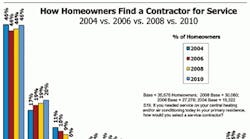Over the course of 2012, this space will identify opportunities within customers’ homes that you may not have observed in the past. The opportunities are based on a recent homeowner survey conducted by Decision Analyst, Inc.
Q: What is the value of public relations to an HVAC contractor?
A: As you prepare for increased business, you should be making a list and checking it more than twice. This list should include:
1. Do we have the latest promotions from the manufacturers, and distributors?
2. Are we ready to execute our marketing program?
3. Do we have the local utility and municipality programs copied and ready for our technicians and sales person/s?
4. Where are we with our service agreement customers?
5. Is our clean and check promo almost over or just ready to run?
6. Are our training, certification, product information and in-home public relations (PR) programs ready to roll?
In-home PR? Why do we need in-home PR? Isn’t PR for corporations that want to spin what’s going on and keep their name positive with the public?
If you or your technicians don’t take the time to-practice respect for your new homeowner, and get to know the homeowner; and if you don’t impress the homeowner with your professionalism, and the fact that you care, it doesn’t matter how many houses you’re in, long term. In fact, the more houses you’re in without impressing the homeowner, the more often you lose your customer opportunity for the next service call.
Many reading this article remember a time when no one went to a house to check out a working unit. Now, it accounts for half of the visits a contractor makes to a home annually. When homeowners have their systems checked, in- season emergency calls are greatly reduced, and service agreement homeowners have almost no emergency calls.
Emergency calls are what keep many contractors in business. The homeowner calls the contractor they want first, and then call another, and another, and another, until they find a real person who can schedule a quick visit to the house.
Here’s the research. We asked homeowners, “how would you select a service contractor?” Two out of every three told us they would ask the HVAC contractor who had worked for them in the past or would asked a friend about a contractor they trusted.
Before price, before the use of credit cards, before a great advertising campaign, and before local promotions, your presence in the customer’s home or their friend’s home is by far the most important reason for you to get the call, or to get invited in when you contact them.
Here are homeowner comments about contractors who won the opportunity to install central HVAC equipment in homes in the past:
- “The contractor had a professional presence that calmed my fears about letting a stranger into the home.” — Only 47% answered “yes” (over half of the contractors didn’t have a professional presence?)
- “The contractor had a professional demeanor that made me feel I would get a quality installation.” — Only 59% answered “yes” (which means four in 10 didn’t look like they practiced quality).
- “The contractor stood back from the door until I felt comfortable with them. — Only 26% said yes (three fourths didn’t help customer feel comfortable with them? Wow!).
Many contractors who didn’t practice these simple in-home PR activities got the job when someone the customer really wanted was too busy.
In a non-emergency call, can you see where many contractors who got the job this time, won’t get the call ever again? Can you see where simple PR training (helping your staff talk like, walk like, and work like the professionals you feel they are) is so important to your customer and your business? You not only must be a professional you must convince the customer you’re professional while in the home.
The payoff. How do you know when your in-home PR training has paid off? This is especially important during the emergency part of the air conditioning season. You, or someone you trust to be a professional, calls after the work is completed. Your tone is friendly, and you thank the customer for their business.
Simple questions woven into a friendly discussion will help you with the conversation, and help you discover the professionalism your staff displayed while in their home.
Decision Analyst’s American Home Comfort Study of homeowners explores what customers look for in HVAC contractors. To learn more about this study, or to purchase it, contact Garry, at [email protected].








